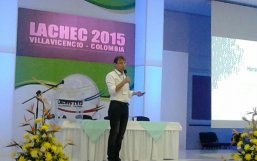Public investment in research: boosting regional development
Jörg Scherer gives talk on “Smart Specialisation Strategies” at LACHEC 2015 Conference in Colombia
On the occasion of the “7th Latin American and the Caribbean Higher Education Conference on Internationalisation” (LACHEC 2015), Jörg Scherer, Eurice CEO, was invited to lead a workshop addressing “Best Practice in International Research Collaboration”.
In his talk he presented strategies and best practices in using international research collaboration to enhance local development. To be more specific, he provided an overview of the concept of “Smart Specialisation Strategies” within the European Research and Higher Education Area – at policy and implementation level. Smart Specialisation is known to be an innovation policy concept designed to promote the efficient and effective use of public investment in research. Its goal is to boost regional innovation in order to achieve economic growth and prosperity, by enabling regions to focus on their strengths. Within this concept, universities and research organisations have been recognized as central to national and international innovation systems.
Furthermore, Jörg Scherer pointed out that, traditionally, the knowledge generated by universities was enclosed in their walls and the role of universities to be a major innovation driver was less required and active. Nowadays, with the increasing global competitiveness of economies, universities are called to address more directly and actively the new challenges that regions face in their economic development. In particular, universities are challenged to become more entrepreneurial. Fostering the entrepreneurial potential of a university is a major challenge which requires an approach that identifies knowledge as an asset which can be created, developed, transmitted and valued.
Against this backdrop, Mr Scherer also gave a concrete example of an Innovation Support Action, the European IPR Helpdesk, offering training and support for researchers to build up competencies and capacities to deal properly with new challenges in the field of Intellectual Property and Innovation Management.
